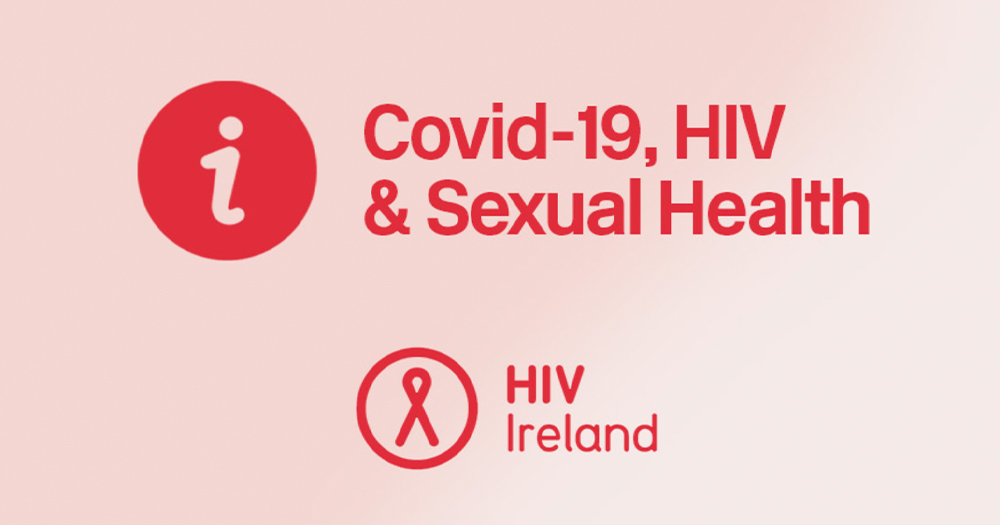With the ongoing Coronavirus pandemic worry enough, HIV Ireland have reached out to reassure people living with HIV who may have concerns about how they may be affected. Before going into a detailed list of information and advice, they stress, “There is currently no evidence that people living with HIV are at increased risk of acquiring #COVID19 due to HIV status.”
In a Q&A style format, HIV Ireland posted the following answers to certain Coronavirus concerns. A fuller list is available at the end of this article.
I am living with HIV, am I more vulnerable to acquiring COVID-19?
There is currently no evidence that people living with HIV are at increased risk of acquiring COVID-19 due to their HIV status.
Am I more vulnerable to the effects of COVID-19?
The HSE has listed a number at-risk groups including people with weakened immune systems. At present, people living with HIV who are on effective treatment are not included on this list. However, if you are living with HIV and not on effective treatment you may be at increased risk and should take steps to minimise the chances of acquiring COVID-19 based on current HSE advice. For more information on at-risk groups please click here.
If you are displaying symptoms of COVID-19 and you are concerned, you should phone your GP / healthcare provider for advice.
I have an undetectable viral load, am I more vulnerable to serious illness from COVID-19?
There is currently very little information on the effects of COVID-19 on people living with HIV who have an undetectable viral load (virally supressed). More data is needed before we know the true impact, if any.
If you know or suspect that your immune system may be compromised (immunosuppressed) due to poor adherence to treatment, a viral load that is detectable, or any other reason, it is sensible to assume that you may be at increased risk from the effects of COVID-19. In these circumstances, you should take steps to minimise the chances of acquiring COVID-19 based on current HSE advice.
Are HIV clinics still operating?
Yes, however some clinics are closed to new appointments and are rescheduling existing appointments. Many HIV clinic staff including infectious disease specialists, nurses, and administrative staff are currently working on the frontline of the COVID-19 pandemic.
If you are due to attend a clinic you will be contacted in relation to your appointment and / or the collection of medication. If you are displaying symptoms of COVID-19 please do not attend and contact the clinic by phone.
If you telephone your clinic and receive a recorded message, you should leave a voice message with your name, your contact number, and your hospital number (if you know it) so that the clinic staff can contact you.
My clinic cancelled my appointment and I have not been given a new appointment date. What should I do?
If your clinic has postponed or cancelled your appointment, you should receive a new appointment date in due course. If you do not receive an appointment date, and you require one, you should contact the clinic. If you require an urgent appointment, you should contact the clinic and explain.
There is currently no evidence that people living with #HIV are at increased risk of acquiring #COVID19 due to HIV status. However, many of you still have concerns, so we have compiled some information and advice for you about HIV and COVID-19. https://t.co/dsvyCrAhIu pic.twitter.com/l0Dkn2MDLN
— HIV Ireland (@HIVIreland) March 30, 2020
I am newly diagnosed with HIV. What should I do?
If you are newly diagnosed with HIV and you are unsure what to do or need additional support, please contact your GP / healthcare provider. You can also contact HIV Ireland Community Support on Tel: 01 8733799 or email [email protected].
I need to renew my medication. What should I do?
If you are currently a patient with a HIV clinic, they will contact you to arrange to collect your medication and to arrange a new appointment. Some clinics may arrange to send your medication by post. You should check with your clinic.
If you have not visited a HIV clinic in Ireland before, you should contact your nearest HIV clinic to arrange an appointment or contact your GP. For additional information and advice you can contact the HIV Ireland Community Support Team on Tel: 01 8733799 or email: [email protected]
What should I do if my medication supply is running low?
Continuing to take to your medication as prescribed by your clinic is extremely important. If your supply of medication is coming to an end, you should contact your clinic to arrange for collection of new medication. If, for any reason, you cannot contact your clinic, please contact your GP / healthcare provider.
If you would like to read the full statement from HIV Ireland regarding PLWHIV and the Coronavirus, please click here.
© 2020 GCN (Gay Community News). All rights reserved.
Support GCN
GCN is a free, vital resource for Ireland’s LGBTQ+ community since 1988.
GCN is a trading name of National LGBT Federation CLG, a registered charity - Charity Number: 20034580.
GCN relies on the generous support of the community and allies to sustain the crucial work that we do. Producing GCN is costly, and, in an industry which has been hugely impacted by rising costs, we need your support to help sustain and grow this vital resource.
Supporting GCN for as little as €1.99 per month will help us continue our work as Ireland’s free, independent LGBTQ+ media.
